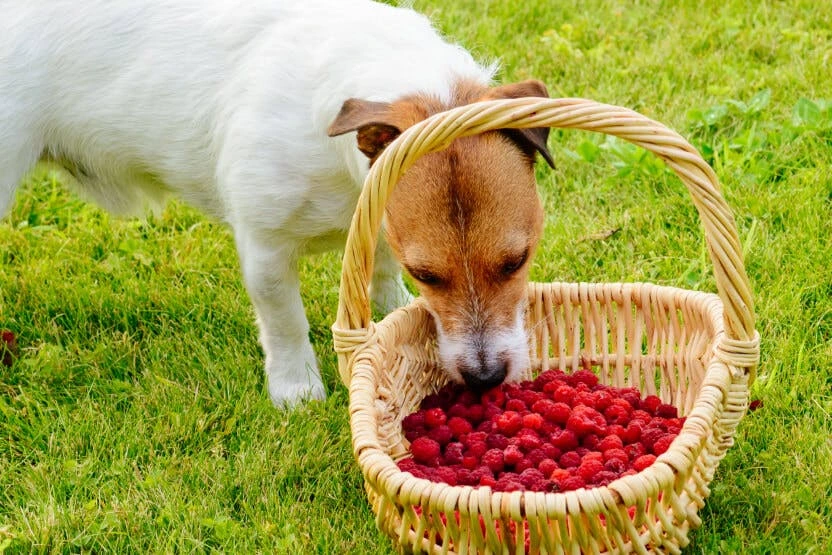As dog owners, it’s natural to wonder which human foods are safe for our furry companions. Raspberries are a delicious and nutritious fruit enjoyed by many people, but can dogs have raspberries too? In this article, we’ll explore the benefits of raspberries for dogs, how to safely introduce them into their diet, and any precautions to take.
Understanding Raspberries and Their Nutritional Value
Raspberries are not only tasty but also packed with essential nutrients. They are rich in vitamins, minerals, and antioxidants that can benefit both humans and dogs. Here are some key nutritional benefits of raspberries for dogs:
-
Vitamins and Antioxidants
- Raspberries are an excellent source of vitamin C, which helps boost the immune system and promotes overall health. They also contain antioxidants that combat free radicals in the body, potentially reducing the risk of chronic diseases.
-
Fiber
- Raspberries are high in dietary fiber, which is crucial for maintaining healthy digestion. Fiber helps regulate bowel movements and can prevent constipation in dogs.
-
Low in Calories
- With only about 52 calories per 100 grams, raspberries are a low-calorie treat option for dogs. This makes them an excellent choice for pet owners concerned about their dog’s weight.
-
Hydration
- Raspberries have a high water content, helping to keep your dog hydrated, especially during hot weather.
Can Dogs Eat Raspberries? Yes, in Moderation!
The short answer is yes! Dogs can safely eat raspberries, but they should be given in moderation. Like any treat, raspberries should make up no more than 10% of your dog’s daily caloric intake. Overfeeding raspberries can lead to gastrointestinal upset, including diarrhea or an upset stomach.
Benefits of Feeding Raspberries to Dogs
-
Boosting Immunity
- The vitamin C in raspberries can help strengthen your dog’s immune system, keeping them healthy and resilient against infections.
-
Promoting Healthy Digestion
- The dietary fiber in raspberries supports digestive health and can help regulate bowel movements.
-
A Natural Sweet Treat
- Dogs enjoy sweet flavors, and raspberries provide a healthier alternative to sugary treats.
How to Introduce Raspberries to Your Dog’s Diet
When adding new foods to your dog’s diet, it’s essential to do so gradually. Here are steps to safely introduce raspberries to your dog:
-
Start Small
- Begin by offering your dog a small piece of fresh raspberry to see how they react. Monitor for any signs of allergies or digestive issues.
-
Wash Thoroughly
- Before serving raspberries to your dog, ensure they are thoroughly washed to remove any pesticides or chemicals that may be harmful.
-
Serve Fresh or Frozen
- Fresh or frozen raspberries are the best choices for your dog. Avoid giving your pet raspberry jams, sauces, or processed foods containing raspberries, as these often include added sugars and preservatives that can be harmful.
-
Cut into Small Pieces
- If you have a smaller dog, cut the raspberries into smaller pieces to prevent choking, although raspberries are generally soft and easy to chew.
Precautions to Take
While raspberries are safe for dogs, there are some precautions to keep in mind:
-
Allergies
- Just like humans, dogs can have food allergies. If your dog shows signs of an allergic reaction—such as itching, swelling, or gastrointestinal upset—stop feeding them raspberries immediately and consult your veterinarian.
-
Sugar Content
- Although raspberries are low in calories, they do contain natural sugars. Too much sugar can lead to obesity and dental problems in dogs. Moderation is key.
-
Avoid Moldy Raspberries
- Always check for mold before giving raspberries to your dog. Moldy fruit can be harmful and may cause gastrointestinal distress.
Alternatives to Raspberries
If your dog does not enjoy raspberries or you’re looking for variety, there are many other fruits that are safe and healthy for dogs. Here are a few options:
- Blueberries: These tiny fruits are packed with antioxidants and low in calories.
- Watermelon: A hydrating summer treat; just be sure to remove the seeds and rind.
- Bananas: A good source of potassium and fiber, but should be given in moderation due to their higher sugar content.
- Apples: A crunchy snack that's high in fiber; just remove the seeds and core.
Conclusion
Raspberries can be a delightful and nutritious treat for dogs when offered in moderation and prepared correctly. By understanding what foods are safe and beneficial for our pets, we can enrich their lives and ensure their well-being. Always keep an eye on your dog’s reactions when introducing new foods, and consult your veterinarian if you have any concerns about their diet or health.
Takeaway Tips for Feeding Raspberries to Dogs
- Introduce Gradually: Always start with a small amount to see how your dog reacts.
- Wash Thoroughly: Clean raspberries to remove pesticides and chemicals.
- Moderation is Key: Treats should not exceed 10% of your dog’s daily caloric intake.
- Serve Fresh or Frozen: Opt for fresh or frozen raspberries; avoid processed options.
- Watch for Allergies: Monitor your dog for any adverse reactions when trying new foods.
With these tips in mind, you can confidently share raspberries with your furry friend, ensuring they enjoy this tasty treat safely!


